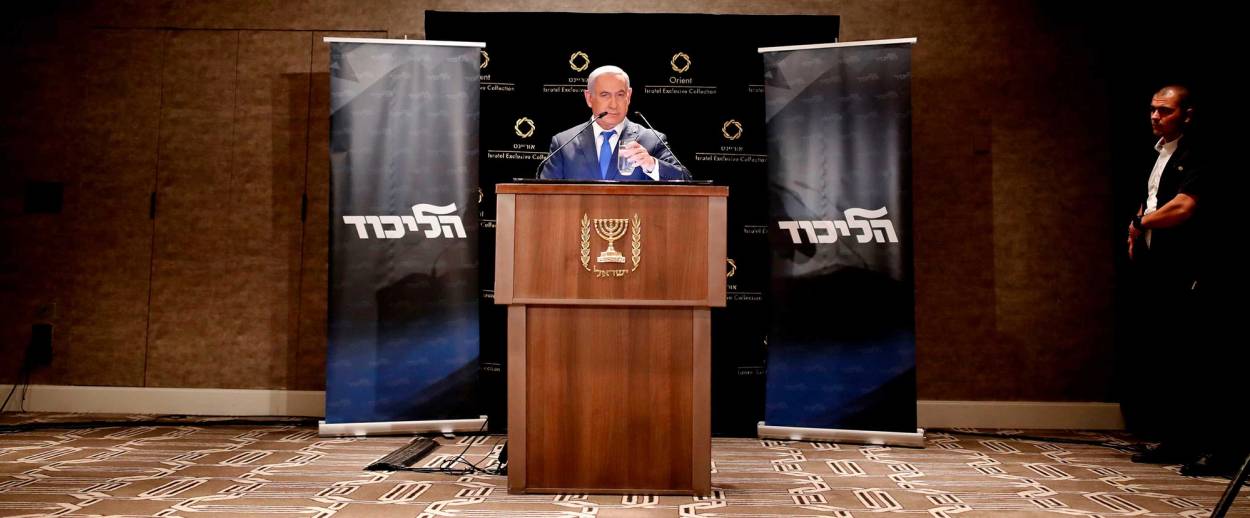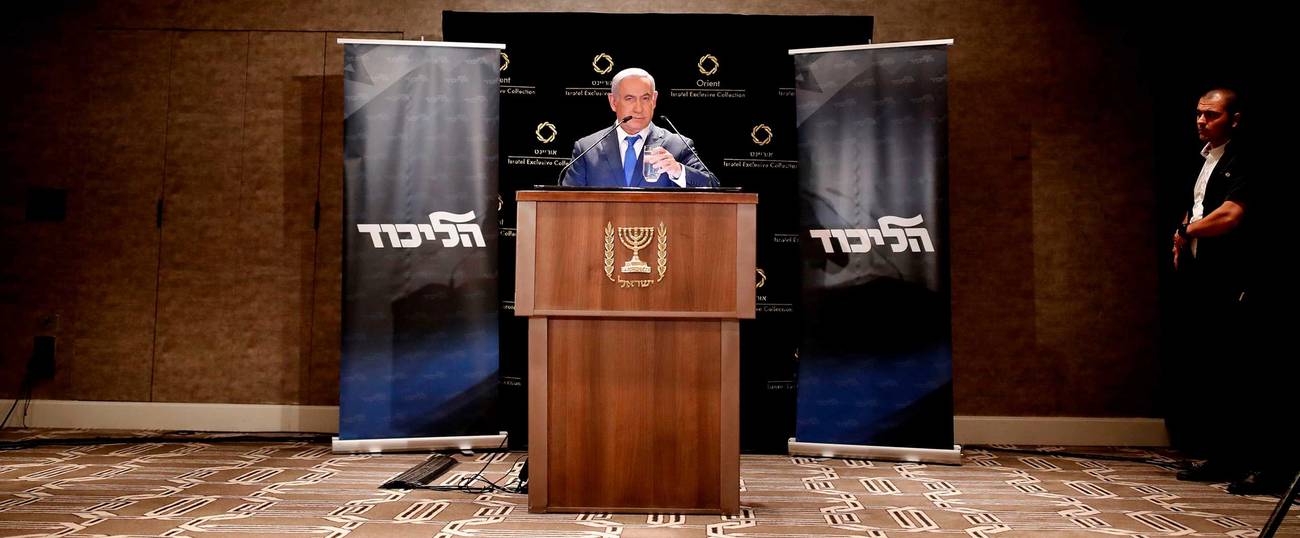Why the Upcoming Israeli Rematch Elections Are a Race to the Bottom
Wondering what’s going to happen in September? Just look at these depressing numbers.




Israel’s repeat elections on Sept. 17 are going to be a race to the bottom. Not just because the campaigns will likely be dirtier than last time, but also because they will be decided by whomever can fish the most votes out of the garbage, persuading the many Israelis who “wasted” their votes on minor parties in April or did not vote to switch allegiances.
In the April 9 elections, over 400,000 votes—a record 7.7% of the national vote share—went in the trash. In Israel’s highly proportional electoral system, political parties are allocated the 120 Knesset seats in proportion to their national vote share. But to qualify, parties must achieve a minimum 3.25% of votes nationwide. In April, this meant three parties that won a sizable share of the vote were nonetheless eliminated.
And that cost the right an even bigger victory. The conservative-nationalist New Right Party of popular ministers Naftali Bennett and Ayelet Shaked was less than 1,500 votes short of getting in. The libertarian-nationalist Zehut Party of Moshe Feiglin won 2.74% of the vote; and Orly Levy’s social-minded Gesher Party disappointed with 1.73%. But if these 391,330 wasted votes had gone to other right-wing parties, the right-wing bloc could have won 66 seats without Avigdor Lieberman—and a resounding 70 seats in total (compared to the final result of 65). In other words, Netanyahu would have been able to form a solid right-wing coalition—and secure a historic fifth term, including support for immunity from prosecution in his three criminal cases.
The stakes could not be higher on Sept. 17. The right-wing bloc is determined not to be foiled by its own internal divisions again—and the opposition bloc is shifting gear for a rematch. Here are 10 big questions to keep an eye on this time.
1. Will Blue & White put up a better fight?
Blue & White put up an impressive fight, winning over one million votes and only 15,000 votes off first place. It was a last-minute alliance of three parties, two of which—Benny Gantz’s Israel Resilience and Moshe Yaalon’s Telem—were also formed at the last minute. They merged two party operations on the eve of the deadline to register, entering late in the game.
Now, things are different. They have a streamlined party machine and their candidates have experience campaigning. Moreover, they have a big treasure chest—parties get state funding based on their seat share in the outgoing Knesset—and will invest more heavily in social media advertising. Candidates may also take two parliamentary advisers on the campaign trail, so Blue & White now has 70 aides for its 35 MKs, as opposed to only 22 last time.
Blue & White might also take more votes from Labor, which is humiliated from revelations it seriously considered an offer to join Netanyahu’s government—after promising not to do so under under any circumstances. But if Labor runs together with Meretz under a younger, fresher leadership—as is being discussed—they might also take votes off of Blue & White.
But the party will likely be held back by the strange rotation agreement between Gantz and Lapid: the pledge to take turns as prime minister if they win. Polls showed a significant number of Israelis would be more open to voting for Blue & White if former army chief Benny Gantz were its sole candidate for premier. Lapid’s insistence on serving as prime minister might cost them key votes.
Will Blue & White run a more targeted campaign to peel away right-wing voters on specific issues? Will it start challenging the Likud itself, instead of just confronting Netanyahu? Could it recruit some star talent? See point 2.
2. What will Orly Levy do?
Ex-Yisrael Beitenu lawmaker Orly Levy set up her own Gesher Party to campaign on what Israelis call chevrati issues—social, real-life issues, like health care. She had hoped to be the kingmaker, but won only 74,000 votes.
Orly Levy has not announced her plans but she is unlikely to head her own party, if only because of the prohibitive cost. But she could negotiate a spot in another party. There is bad blood with Blue & White, but the match would make sense: Gantz could promise her the Health Ministry, and she would break up the generals’ party’s macho image. Blue & White lawmakers would not be happy to be pushed down the list, but they could be assuaged if polling shows Orly Levy could bring votes over from the center-right, especially since … See point 3.
3. Where will Kulanu’s votes go?
Moshe Kahlon’s Kulanu Party campaigned as the “sane right,” appealing to center-right voters who felt Likud was becoming too extreme. But having collapsed from 10 to four seats, and unable to afford a new campaign, Kahlon agreed to run with the Likud, his original party, in September. He is unlikely to shift all of his 153,000 voters to the Likud. At least half of these moderate voters will be prime-picking for Blue & White, which could pick up two seats.
4. How will the religious nationalists run?
Last time, there were two religious nationalist lists: the Union of Right Wing Parties (a merger of the Jewish Home, National Union, and Jewish Power), which won 3.7%, and the less radical New Right Party, which failed to win seats.
Nobody knows what they will do this time. There is tension between the leaders of Jewish Home and National Union over who will get the more senior cabinet portfolio; and the alliance has proven worthless to Jewish Power, which failed to get a representative in the Knesset. Naftali Bennett plans to run again with the New Right Party, but his partner Ayelet Shaked has not yet committed.
This is the wildcard. If these four parties run together and win 298,000 votes like last time, they could win 8-9 seats (up 3-4). But if Jewish Home joins with New Right, and National Union joins with Jewish Power, one or both could fail to cross the electoral threshold. If New Right runs alone, it could do even worse than last time, because voters frustrated that their vote was wasted will not easily repeat the same mistake. Their votes could be distributed among the rest of the right. Then again, Naftali Bennett is known to be interested in a possible run with Moshe Feiglin’s Zehut Party, and may use his personal wealth to pay for part of the campaign. Together, they would present a hard line against concessions to the Palestinians and economic liberalization, and could be a surprisingly coherent fit.
5. What will happen to voter turnout?
Most likely, the major swings will come from differential voter turnout. In April only 68.5% of Israelis voted, so there are 2 million more votes potentially up for grabs. In Tel Aviv, where Blue & White won nearly 46% of the vote, turnout was more than 5 percentage points below the national average. If it can boost turnout among its core constituency, it could reap an electoral bonus.
But turnout is likely to be lower. Historically, that’s the case when countries hold elections twice in the same year: Turnout dropped 6 points in Britain’s two elections in 1974, and 7 points in Greece’s two elections in 2015. Unless one side reinspires a sense of urgency, people are less likely to believe their vote matters. “If in the first round you held your nose and voted for someone, it’s less likely you’ll do the same this time,” says political psychologist Haggai Elkayam Shalem, host of the popular political podcast The Spinner.
And low turnout is good for more extreme, sectoral parties. Israel has “electors and voters”, says Channel 12 political analyst Amit Segal: those who actively choose whom to back, and those who vote as their community leaders tell them. Shas and United Torah Judaism can bank on around 250,000 votes each, under orders from their rabbis to vote. A low national turnout will disproportionately benefit Netanyahu’s ultra-Orthodox backers.
But vote share among the Arabs is likely to rise. Two Arab lists ran last time: Hadash-Taal and Raam-Balad. They voted with Netanyahu to dissolve the Knesset, expecting they could run together again as the Joint List, like in 2015. Overturning apathy on the Arab street, they could easily win 13 seats.
6. Will Israelis be willing to switch their votes?
By all accounts, not much. Swings in public opinion take time, and swings between the blocs are rare. “People regret things they do,” says Haggai Elkayam Shalem, “but it takes them a long time.” The last time Israel saw a major shift in the blocs, he observes, was 2006-2009, when around 15 seats shifted from left to right.
7. Who will be financially pressured into conceding?
Elections cost money. And in Israel, parties fund them by taking out bank loans they expect to repay when they get state funding based on the number of seats they won. These debts can be a crippling problem for parties that failed to cross the threshold, or only just got past. They need to pay suppliers and campaign staff. Moshe Feiglin might sit out the election, and his 2.7% of the vote could go back to the other right-wing parties.
8. Will there be any more spoilers?
It’s still very early days, but new parties could still emerge. Could ex-politicians try to make a comeback and deprive someone of precious votes?
9. Can the Likud annihilate Yisrael Beitenu?
The Likud is so furious at Yisrael Beitenu that Netanyahu called Lieberman “part of the left.” It is now threatening to go nuclear on Lieberman and run a blitz of Russian-language ads to bite into his electorate.
In April, Yisrael Beitenu won only 4% of the vote, or 173,000 votes—just 0.75% above the electoral threshold. Even a small swing to the Likud and a minor change in turnout could leave Lieberman out in the cold. But Lieberman can now credibly frame this election as being about religion and state—and the more the elections are about that issue, and the more Netanyahu and the Haredim attack him, the more credit he can take for standing up to the ultra-Orthodox.
So if Likud fails and Lieberman returns … See point 10.
10. What if September’s results are exactly the same?
If all the “what ifs” cancel each other out, Israel will return to square one: Netanyahu’s right-wing/religious bloc fails to win 61 seats without Yisrael Beitenu. What then? Lieberman has ruled out recommending Gantz as prime minister. The question of the ultra-Orthodox draft would bedevil Netanyahu’s coalition negotiations. Lieberman is unlikely to back down after forcing an election on this issue, so Netanyahu might try harder to force Agudat Yisrael, the Hasidic faction of UTJ, to accept Lieberman’s demand.
But if that fails, and if Netanyahu fails again to bribe, cajole, or threaten opposition lawmakers to defect, he will have to concede defeat. At that point, either Likud lawmakers agree to get dragged back into the third elections of the year, or there is a palace coup and Netanyahu is forced to resign—opening the way for a national unity government. Nobody wants to wield the knife now—but nobody wants to repeat elections indefinitely just to save Netanyahu.
But that scenario is many “what ifs” later, and Israeli politics are notoriously full of surprises. There are 102 days to find out what they are.
***
You can help support Tablet’s unique brand of Jewish journalism. Click here to donate today.
Eylon Aslan-Levy is an Israeli news anchor and political commentator. He is a graduate of Oxford, Cambridge and the IDF.